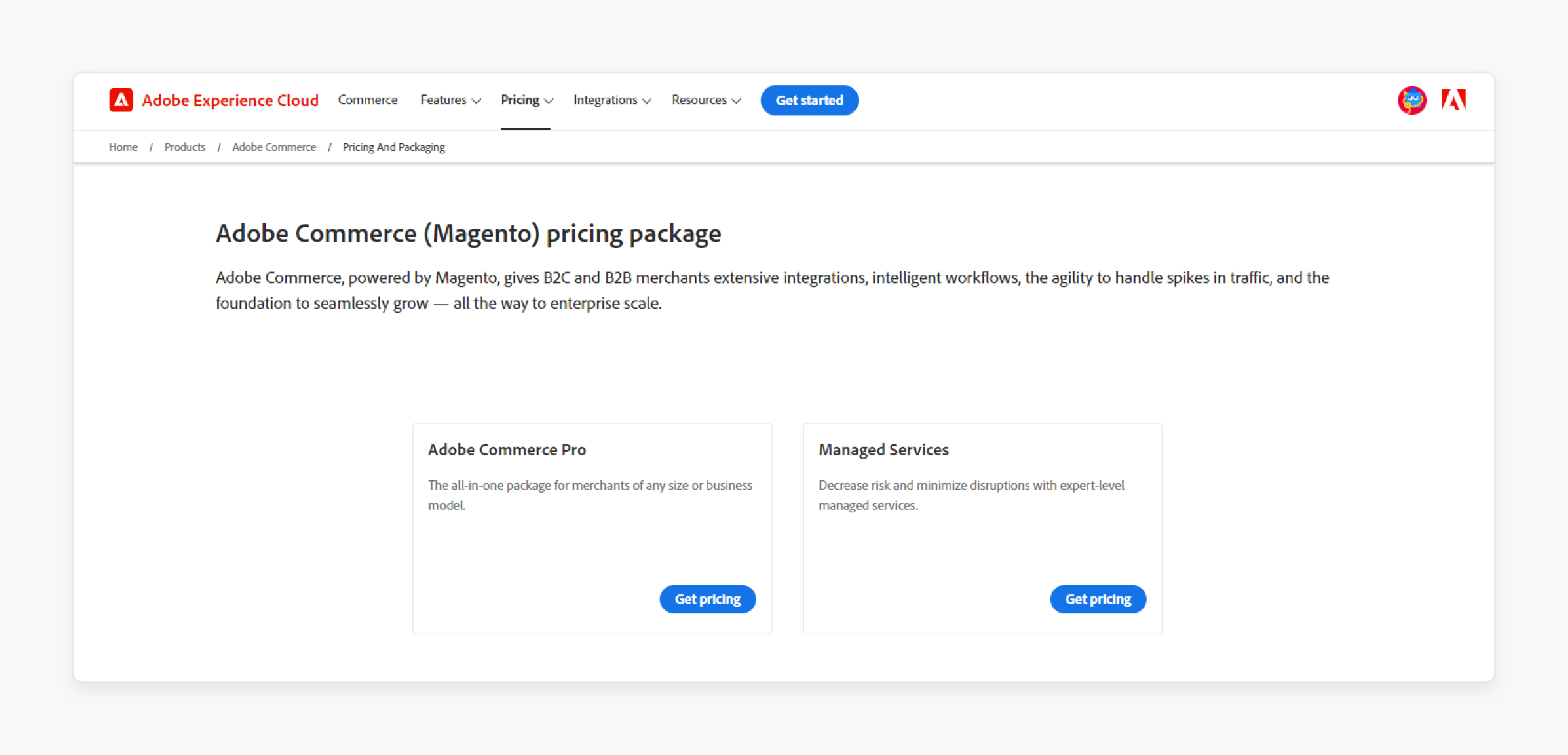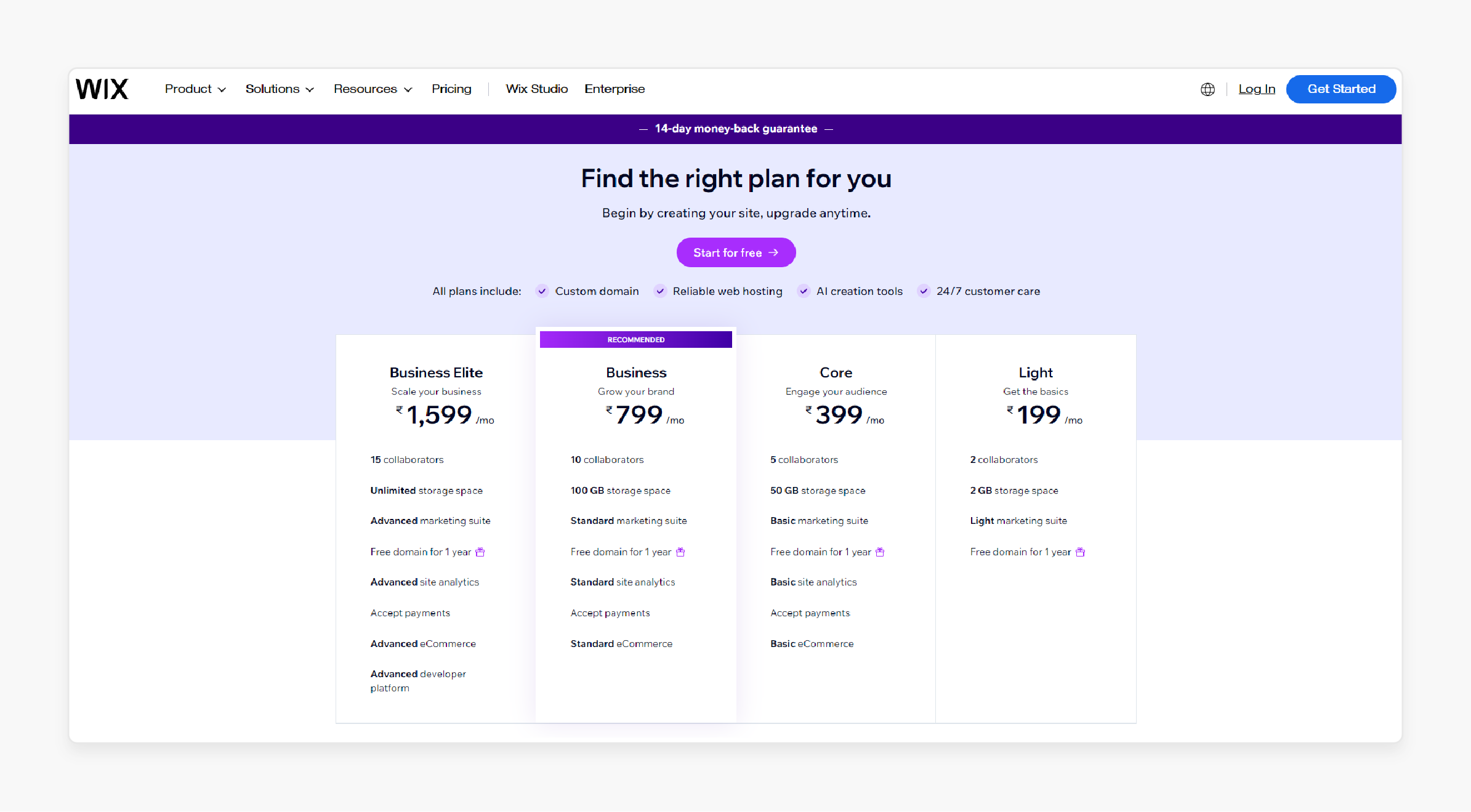
Magento vs Wix: Which E-commerce Platform is Best for You?
Need help deciding on a platform for your online sales? Magento vs Wix is a common comparison when selecting an e-commerce solution. Both platforms offer unique features for building and managing online businesses.
In this article, we’ll learn how they differ and which one best fits your online business needs.
Key Takeaways
-
Magento and Wix offer distinct solutions for ecommerce needs.
-
Magento is open-source and highly customizable for large stores.
-
Wix is user-friendly, with drag-and-drop features for smaller shops.
-
Magento provides better scalability and integration options.
-
Wix offers a simpler setup and predictable pricing plans.
-
Both platforms include essential security features for online stores.
-
Choosing the best platform depends on your business growth goals.
Magento vs Wix: The Fundamental Difference
Magento and Wix — the two famous platforms take different routes towards e-commerce success.
Magento is open-source and works well for big companies. It's flexible and can grow with large businesses. Its learning curve can be steep for newcomers. Wix, conversely, is a user-friendly website builder with e-commerce features. It targets small to medium-sized businesses and beginners.
Magento's strength lies in its broader customization capabilities and robust features. However, it demands technical expertise or professional developer support. On the contrary, Wix is simpler.
In Wix, you can drag and drop to build your site. But it might not have all the extensive features you want. The platform’s ease of use comes at the cost of advanced features.
Comparing Magento and Wix Performance Metrics
1. Page Load Speed
Magento typically outperforms in page load speeds. Advanced caching techniques optimize Magento's performance significantly. Wix's server response time can lag slightly behind. Users may notice longer wait times on Wix stores.
For example: A Magento store loads in less than 2 seconds. A Wix store might take 3-4 or more seconds.
2. Scalability
Magento excels at handling large product catalogs efficiently. It can manage thousands of products easily. Wix has limits on how many products you can have.
For example: Magento can handle 100,000+ products easily. Wix might struggle with over 50,000 products.
3. SEO Tools
Magento gives you more SEO tools to use and explore. Users gain full control over meta tags and URL structures. Wix has basic SEO features but not as many options.
For example: With Magento, you can edit your robots.txt files. Wix doesn't let you do this.
4. Mobile-Friendly Design
Both Magento and Wix make sites that work on phones. Magento needs more customizing to look good on mobile. Wix makes sure all themes work on phones automatically.
For example: Magento needs device-specific testing and adjustments. Wix themes always work on phones.
5. Integration Capabilities
Magento integrates with many third-party business tools. Its robust API connects with various systems and services. Wix has fewer options, but they're easier to use.
Magento works with big business systems and entrepreneurs. Wix focuses on simpler integrations for small businesses.
Pricing Comparison: Magento vs Wix

Magento Costs
-
Open Source: Free to download
-
Adobe Commerce/Commerce Cloud: Custom price (higher than Wix)
-
Hosting: $10-$250+ each month
-
Add-ons: $0-$500+ each
-
Developers: $50-$200+ per hour
Magento's price changes based on what you need. The Open Source version comes free but requires technical know-how. Adobe Commerce costs a lot but has more features. Managed vs unmanaged hosting depends on your site's size and your tech proficiency. Add-ons can be cheap or pricey. You might need to pay for expert assistance.
Wix Costs

-
Light: $17/month
-
Core: $29/month
-
Business: $36/month
-
Business Elite: $36/month
-
Apps: $0-$50+ each month
Wix has set prices for different store sizes. Basic is for small shops. Unlimited removes extra fees. VIP gives you more help. Enterprise is for big businesses. Apps can add to your monthly cost.
5-Year Cost Comparison
-
Magento: $20,000-$100,000+ (varies a lot)
-
Wix: $1,380-$2,940 (regular plans)
Magento often costs more but lets you do more. Wix costs less and is more predictable. Think about how big you want to grow when you choose.
Security Features and Compliance Capabilities
| Feature | Magento | Wix |
|---|---|---|
| SSL Certificates | Included (depends on host) | Free with all plans |
| PCI Compliance | You manage it | Wix manages it |
| GDPR Tools | Advanced tools available | Basic features included |
| Security Updates | You need to update | Updates happen automatically |
| Two-Factor Login | Available (might need add-on) | Available for all accounts |
Magento has strong security, but you need to manage it. It gives you the tools to follow strict rules. You must keep it updated to stay safe. Wix handles most security stuff for you. It makes following rules easier for small businesses. Both keep your data and sales safe.
Magento vs Wix: Which is More Developer Friendly?
| Category | Magento | Wix |
|---|---|---|
| Customization Capabilities | - Provides full access to source code - Allows extensive theme customization options - Supports advanced module development - Enables complex database modifications - Features an API-driven architecture. |
- Offers limited code access -Uses template-based customization approach - Provides Velo by Wix for advanced features - Restricts database access for users - Has some API limitations |
| Learning Curve | - Presents a steep learning curve for beginners - Requires solid PHP programming knowledge - Involves mastering a complex architecture - Offers extensive documentation for developers - Boasts a large, active developer community |
- Features a gentle learning curve for novices - Requires no coding for basic site creation - Needs JavaScript knowledge for Velo usage - Provides limited advanced documentation resources - Has a smaller developer community |
| Development Environment | - Requires setting up local development environments - Supports version control integration - Allows multiple staging environments - Offers CLI tools for efficient development - Uses Composer for dependency management |
- Provides cloud-based development platform - Has limited version control capabilities - Offers a single staging environment - Features visual development tools - Lacks a package management system |
| Extension Development | - Maintains an open marketplace for extensions - Uses a complex extension architecture - Allows modifications to the core functionality - Implements extensive testing requirements - Offers revenue-sharing options for developers |
- Operates a closed-app market - Provides limited app development options - Restricts core modifications for developers - Simplifies the app submission process - Shares revenue through Wix App Market |
| Performance Optimization | Grants full control over caching mechanisms - Enables server-side optimization techniques - Allows advanced database query optimization - Provides front-end performance tuning tools - Supports third-party CDN integration |
- Offers limited caching control options - Manages server optimizations automatically - Restricts database access and optimization - Includes built-in performance enhancement features - Uses an integrated Wix CDN |
Customizability and Extension Support Comparison
| Aspect | Magento | Wix |
|---|---|---|
| Theme Customization | Unlimited theme customization options | Over 500 pre-designed templates available |
| Custom Functionality | Extensive module system for additions | Limited custom code implementation options |
| Extension Marketplace | Magento Marketplace (10,000+ extensions) | Wix App Market (250+ apps) |
| API Support | Robust REST and GraphQL APIs | Limited API access for developers |
| Design Flexibility | Complete control over HTML/CSS | Template-based design system with restrictions |
Magento's open architecture allows unparalleled customization possibilities. Developers can modify every aspect of the store. The Magento Marketplace offers solutions for various business needs. Robust API support enables complex integrations with external systems.
Wix focuses on user-friendly customization within its ecosystem. It provides a wide range of pre-designed templates. The Wix App Market offers easy-to-install functionality additions. Design flexibility remains limited to Wix's visual editor and Velo platform.
FAQs
1. What are the key differences between Magento and Wix?
The differences between Magento and Wix include flexibility and scalability. Magento is an open-source platform offering extensive customization options. Wix, a drag-and-drop website builder, is easier to use. Magento also handles complex ecommerce stores, while Wix caters to simpler needs.
2. Why choose Magento over Wix for an ecommerce platform?
Magento offers greater customization, especially for complex ecommerce stores. Unlike Magento, Wix is easier to set up but lacks scalability. Magento developers can build highly tailored solutions ideal for businesses that plan to grow.
3. What features does Wix ecommerce provide?
Wix ecommerce offers a user-friendly interface with drag-and-drop functionality. It also provides built-in SEO tools, Wix Payments, and customizable templates. However, Wix doesn’t offer the flexibility that Magento Commerce provides for larger ecommerce platforms.
4. Is Magento a better ecommerce platform than Wix?
Magento is a platform known for scalability and customization. Wix is easier to use but less flexible for large-scale ecommerce stores. If you plan to scale, Magento might be better suited for your needs.
5. Is Wix easier to use than Magento?
Yes, Wix is far easier to use than Magento. Wix is built for beginners, with a simple drag-and-drop website builder. Magento, while offering more control, requires more technical knowledge to operate.
6. What are the biggest downsides of using Wix?
The biggest downside of Wix is the lack of advanced customization. Although Wix supports basic ecommerce, it doesn’t match the flexibility that Magento open-source offers. For larger businesses, Magento might be a better option.
7. Why do businesses choose Magento over Wix?
Businesses choose Magento for its flexibility and customization options. Magento also supports large-scale ecommerce websites. Whereas Wix is known for ease of use, Magento wins in scalability for growing stores.
Summary
The answer to the Magento vs Wix debate depends on user preferences. The prior is a bit pricey but more scalable and extensive. The latter is meant for budding ecommerce enthusiasts. Here are the key highlights of the comparison:
-
Magento caters to large, complex e-commerce operations. Technical expertise unlocks extensive customization options.
-
Wix serves small to medium businesses effectively. Its user-friendly platform offers limited advanced features.
-
Magento's pricing varies based on specific requirements. Long-term costs include development and hosting considerations.
-
Wix provides predictable, all-inclusive pricing plans. Small businesses benefit from simplified budgeting.
-
Magento excels in developer-oriented features. Complex customizations and integrations are possible.
-
Wix prioritizes ease of use over advanced development. Quick setup comes at the cost of limitations.
Managed magento hosting helps boost your store performance through 24/7 expert assistance.







